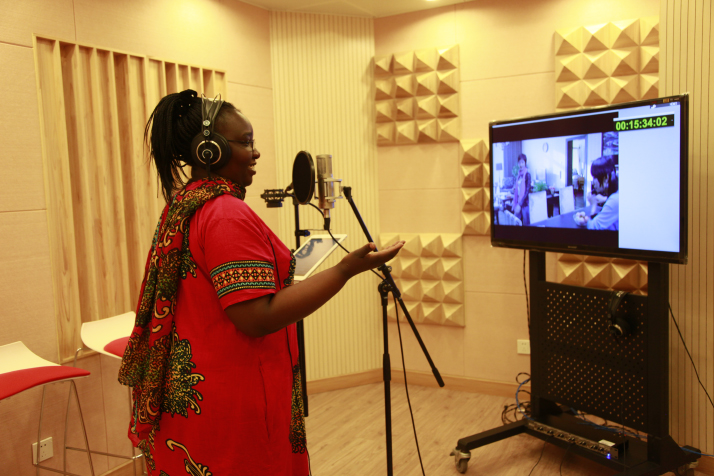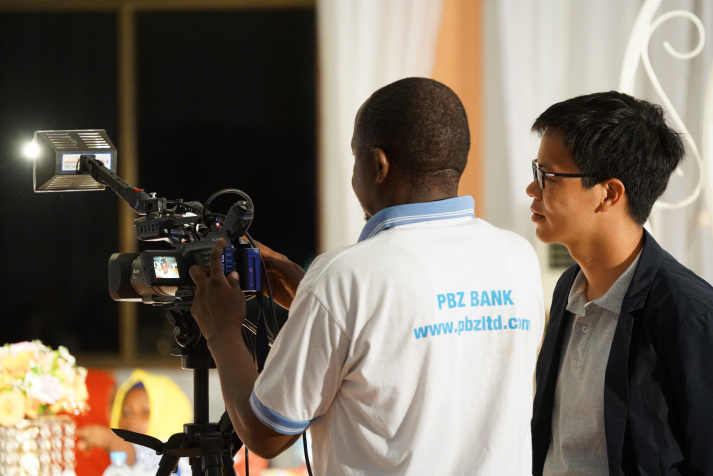|
||||||||||
| Home Nation World Business Opinion Lifestyle ChinAfrica Multimedia Columnists Documents Special Reports |
|
||||||||||
| Home Nation World Business Opinion Lifestyle ChinAfrica Multimedia Columnists Documents Special Reports |
| ChinAfrica |
| Lights, Camera, Action |
| Chinese and African filmmakers expand cooperation platforms to maximize their potential |
| By Li Xiaoyu | VOL.11 June ·2019-05-29 |

A local actress works at Chinese broadcasting company StarTimes' Translation and Dubbing Center in Kenya to dub the Chinese TV series Who Is in Charge of My Youth into Swahili (XINHUA)
Film buffs are regarding 2018 as a golden year for both Chinese cinema and Sino-African film cooperation. Released during the Spring Festival in 2018, the Chinese antiterrorism action movie Operation Red Sea has grossed more than $3.65 billion at the box office, becoming one of the most profitable Chinese films in history.
Many cinema goers don't know that most of the footage of the overseas evacuation sequence was filmed in Morocco. According to Dante Lam, Director of the film, the Moroccan army provided considerable support for the shooting of the film, supplying tanks, armored vehicles and helicopters to his team, with even the elite gendarmerie of the Royal Guard participating.
Just a few years ago, Zhang Yong, Director of the Center for African Film and Television Studies (CAFTS) at Zhejiang Normal University, called on Chinese filmmakers to take a closer look at Africa and what it has to offer. "Despite the growth of our cinema, I have never seen one [film] shot in Africa," he said.
Yet, with films like Wolf Warriors II and Operation Red Sea, this is no longer the case today. The African continent is now an ideal place for Chinese filmmakers. China and Africa have made much progress in their collaboration on the big and the small screens and have seen their channels of collaboration diversify.
Film opportunities
For Zhang, there is a lot of potential in this area. "From the Great Rift Valley to the lush tropical jungle through the Serengeti, Africa abounds in natural and human resources. We can find almost all the scenes we can't find elsewhere," he said. In addition, African literature is also an inexhaustible source of inspiration for Chinese filmmakers, as evidenced by the long list of African winners of the Nobel Prize for Literature, including Wole Soyinka, Naguib Mahfouz, Nadine Gordimer, John Maxwell Coetzee, among others. Historically, Sino-African exchanges have witnessed many special events and moments that can translate effectively to film production. One prime example is the participation of 50,000 Chinese engineers and workers sent to Tanzania to assist in the construction of the famous Tanzania-Zambia Railway (TAZARA) during the 1970s, marking the deep friendship between China and African countries. According to Zhang, this is the kind of story likely to be adapted to the big screen.
What African countries expect most from the Chinese film industry is their participation in training, Zhang said. "In this regard, China has a technical, material and skills advantage," he added. For example, the Tanzanian Film Association and the Chinese Embassy in Tanzania have concluded a framework cooperation agreement focusing on training in photography and recording.
However, this field of possibilities is still fallow. According to Zhang, the lack of communication between Chinese and African filmmakers is the source of this situation.

Zhang Yong and a local cameraman during the shooting of a documentary on Tanzania-Zambia Railway (ZHANG YONG)
Increasing exchanges
In order to deepen mutual understanding, the two sides have jointly organized forums and film festivals in recent years. This is the case, for example, with the Forum on China-Africa Film and Television Cooperation, initiated by Zhang in 2015.
The inaugural forum was held in Jinhua, Zhejiang Province in December 2015, where some 100 participants reviewed the history and current state of China-Africa exchanges in the film industry and discussed channels and perspectives of collaboration.
According to Tian Zhongchu, Dean of the College of Creative Culture and Communication of Zhejiang Normal University, the forum gave participants an opportunity to reflect more deeply on the differences and commonalities between diverse civilizations and to renew the vision of film making on the African continent.
The second session of the forum was held in 2017 in Zanzibar, Tanzania. The Chinese delegation was welcomed by the Tanzanian Minister of State Issa Haji Ussi Gave. He took the opportunity to share two suggestions. He wished to see a strengthening in training initiatives of local staff and also hoped that China and Tanzania can jointly produce a film in honor of the friendship between the peoples of both countries. Most aptly, on December 30, 2017, Zhang Yong's production team began filming the documentary TAZARA: A Journey Without an End at Dar es Salaam Station.
The third session of the forum is scheduled for July 2019 in Yaoundé, Cameroon. During this event, films as well as Chinese and Cameroonian soap operas will be broadcast and the CAFTS will announce its new production program.
On October 16, 2017, the First China-Africa International Film Festival was held in Cape Town, South Africa. Nearly 500 guests from China, South Africa, Botswana, Tanzania, Ghana, Namibia and Nigeria gathered to discuss the achievements of the Chinese and African film industries and share their accumulated experiences on the subject. According to Tao Hong, the festival's ambassador, this cultural event served as an excellent platform for exchanges between African and Chinese filmmakers. She wants to see more cooperation and communication mechanisms emerge between the two parties in the future.
Broader horizons
In addition to the joint organization of forums and festivals, Chinese and African filmmakers are following other ways of cooperation.
To promote Chinese television, the Chinese Embassy in Tanzania took the initiative in 2011, to have A Beautiful Daughter-in-Law Era, a Chinese soap opera, translated and broadcast on the Tanzania Broadcasting Corp. in Swahili. The broadcast had a great impact. According to Tanzanian national television statistics, at least 6 million viewers followed the series.
A Beautiful Daughter-in-Law Era was closely followed by the launch of the Africa-China Cooperation Project in the Film and Television Industry (also called Project 1052). In this context, 10 television series, 52 films, five cartoons and four documentaries will be selected before being dubbed into seven languages, including English, French, Arabic, Portuguese and Swahili, to facilitate their dissemination in the African media to prime-time viewing. The African public now has access to a good number of Chinese film and television programs, and fans of the shows come from all walks of life.
Although there are still various challenges in Sino-African cooperation in film and television, such as one-way communication, Zhang maintains that cinema and television are a bridge in Sino-African relations. He believes that, at present, cultural and human exchanges have reached an unprecedented level of importance, and that film and television collaboration will bring people even closer together.
(Comments to lixiaoyu@chinafrica.cn)
| About Us | Contact Us | Advertise with Us | Subscribe |
| Copyright Beijing Review All rights reserved 京ICP备08005356号-5 京公网安备110102005860号 |